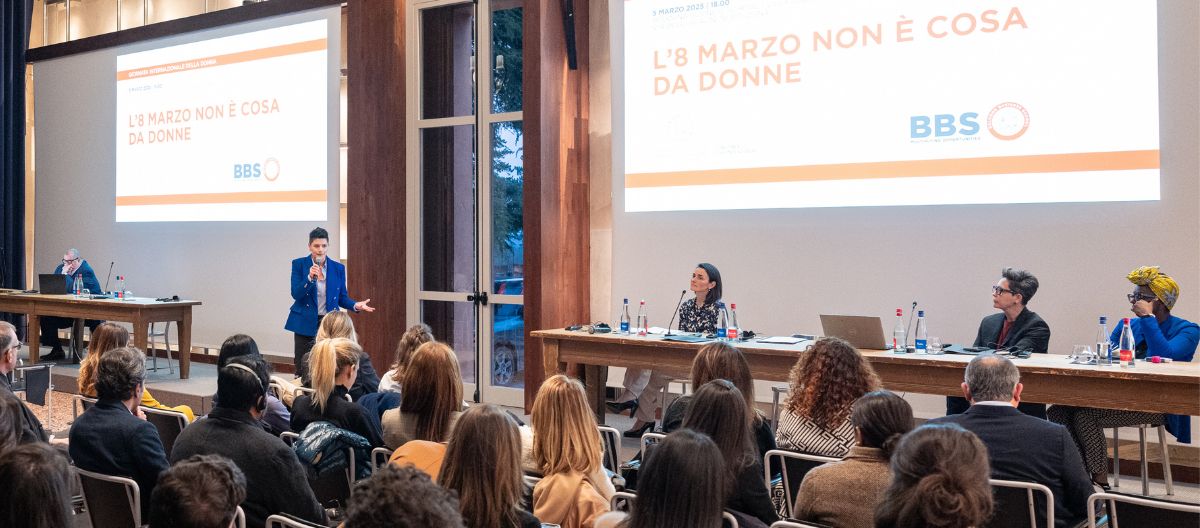
March 8 Is Not a Women’s Issue: A Dialogue on Gender Equality
13 March 2025On Wednesday, March 5, in the Aula Magna of Villa Guastavillani, Bologna Business School hosted the event “March 8 Is Not a Women’s Issue”, an interdisciplinary discussion organized in collaboration with the Department of Management of the University of Bologna.
The event aimed to move beyond the traditional narrative of International Women’s Day and foster a broader reflection on gender equality and the importance of building a shared path toward change.
The event opened with an introduction by Max Bergami, Professor of Organizational Behavior at the University of Bologna and Dean of Bologna Business School. He emphasized how diversity and the value of plurality are central elements in organizations and society. The discussion was moderated by Daniela Bolzani, Associate Professor at the University of Bologna and Associate Dean for EDI (Equity, Diversity & Inclusion) at Bologna Business School. She highlighted the crucial role of interdisciplinarity in addressing complex issues such as gender equality.
“At our Business School, we believe that interdisciplinarity is a key approach to understanding the social, economic, and cultural phenomena we aim to tackle together,” Bolzani stated, explaining how diversity cannot be analyzed from a single perspective but requires an approach capable of integrating multiple viewpoints.
Redefining Identities: Francesca Cavallo’s Keynote Speech
The conversation was kickstarted by Francesca Cavallo, a renowned author and entrepreneur, who shared insights from her research on the construction of male identity. Drawing from her bestselling book Good Night Stories for Rebel Girls, Cavallo explained how her interest in gender equality led her to question the role of men in society and the stereotypes that shape their development.
“I asked myself: why is there a part of me that is so deeply convinced that males are naturally more aggressive, naturally less empathetic?” Cavallo reflected, illustrating how men, too, are confined by rigid social expectations that limit their emotional expression from childhood.
A central theme of her speech was the idea of masculinity as a social status, shaped by strict expectations that influence men’s emotions and behaviors from an early age. “While femininity is a biological status, masculinity is a social status,” she explained, underscoring how this distinction deeply affects gender dynamics and individual identity formation. Through anthropological and sociological studies, Cavallo demonstrated that gender equality is not a zero-sum game between men and women but rather a path to mutual liberation.
Bias, Leadership, and Inclusion: An Open Discussion
Following the keynote speech, the discussion broadened with contributions from Gabriella Crafa, Vice President of Diversity and a member of the Extended Faculty at Bologna Business School, and Sambu Buffa, a change designer and diversity & inclusion trainer.
Both speakers emphasized that gender equality in organizations cannot be limited to programs aimed solely at women but must become a cross-cutting strategic objective.
“Enough with empowerment programs dedicated only to women in organizations, please,” Crafa asserted, stressing the need for a systemic approach focused on diversity transformation.
Buffa highlighted the impact of language and societal expectations on professional and personal trajectories: “Women are often seen as naturally suited for caregiving roles, while men are pushed to avoid showing vulnerability. This shapes their choices and behavior in the workplace.”
From Theory to Practice: The Role of Organizations
Closing the discussion, Angelo Paletta, Director of the Department of Management at the University of Bologna, emphasized the value of inclusive leadership. He pointed out that diversity should not be seen merely as a regulatory obligation or compliance issue but as an opportunity for companies to attract talent, improve organizational climate, and enhance competitiveness.
Toward Meaningful Change
The event provided an open and stimulating space for discussion, bringing forward critical insights on how to dismantle stereotypes and discriminatory practices at both individual and organizational levels. Daniela Bolzani concluded the debate by reinforcing a key message from the discussion:
“Gender equality cannot be a separate battle but must be a collective commitment. We need to move beyond the idea of allies and start seeing men and women as joint protagonists in a journey of social transformation.”
Bologna Business School reaffirms its role as an incubator of ideas and debates on social and managerial issues, promoting an interdisciplinary, innovative, and forward-thinking approach to change.
